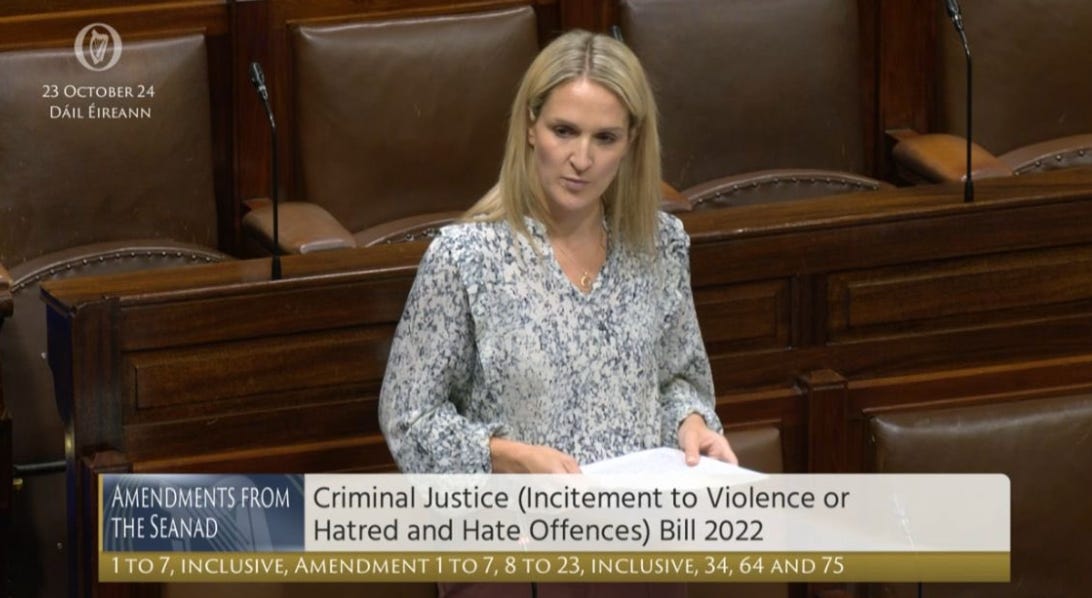Irish Justice Minister Helen McEntee has pushed through a revised version of the controversial Hatred and Hate Offences Bill, now known as the Criminal Justice (Hate Offences) Bill 2022, in which the hate speech element has been removed, but a new category of crime, “offences aggravated by hatred,” has been created. After being amended in a rushed debate in the Senate, it passed through the Dáil, the lower house of the parliament, by a comfortable majority (78 in favour, 52 against) on Wednesday, 23rd of October.
Free subscribers, if you value this content, consider upgrading to a paid subscription which unlocks subscriber-exclusive posts.
As I reported on this blog in September, the original Hatred and Hate Offences Bill, which included reinforced powers to prosecute citizens for unpublished speech, was withdrawn by the Irish Government after attracting a lot of negative publicity, both nationally and internationally. At the time, this was a major victory for the free speech movement. Even though the government’s embarrassing reversal left in place problematic hate speech legislation from 1989, it also killed amendments that would have made hate speech prosecutions easier to secure.
Now, the government has rushed a new version of the bill through both houses of the Parliament. The good news is, the hate speech elements have been removed - though Minister McEntee promises to reintroduce them if her government is re-elected in the upcoming election.
The bad news is, some deeply problematic elements have been preserved in the revised bill, most notably:
(1) the creation of a new category of crime, “offences aggravated by hatred” (yes, you’ve guessed it, “hatred” is nowhere actually defined in a non-circular manner) against any one of the “protected” groups listed in the legislation (race, colour, nationality, religion, national or ethnic origin, descent, gender, “sex characteristics,” sexual orientation, disability);
and
(2) the erection of a brand new definition of “gender” that is hopelessly vague and frankly unintelligible, but also highly amenable to the purposes of the trans lobby, which include the immunisation of transgender ideas and practices from public criticism. The definition of “gender” provided in the bill goes as follows:
“gender” means the gender of a person or the gender which a person expresses as the person’s preferred gender or with which the person identifies and includes transgender and a gender other than those of male and female.
Notably, the revised legislation reinforces and expands the legal doctrine that certain groups in society, under certain circumstances, should enjoy special legal protections not enjoyed by your average man or woman on the street, an idea that seems to put in question the whole idea of equal protection of the law, guaranteed in Article 40 of the Irish Constitution.
The question is, will the Irish people recognise that this government seems more in tune with “progressive” NGOs than ordinary citizens, and seems more interested in policing their speech than protecting their streets? Will Irish citizens have the good sense to punish a government intent on dismantling their rights, or will they keep propping up the mainstream parties, as they have in the past? We will find out in the upcoming elections, slated to be held later this year.









...thanks for the report David... can u mention what was the name of the Dail committee (i'll have to read the articles again, it may be included, ur's and the Expose's) ...also, it seems that 130 members in total voted, with no abstensions, while there are 160 members included in that August 'setting'... it seems that there is an obvious discrepancy here, that begs it's owed a simple explanation...
The World is truly in lockstep. How did we the people ever allow these unelected and elected bureaucrats to gain so much control. They are determined to destroy our society with their cultural Marxism.